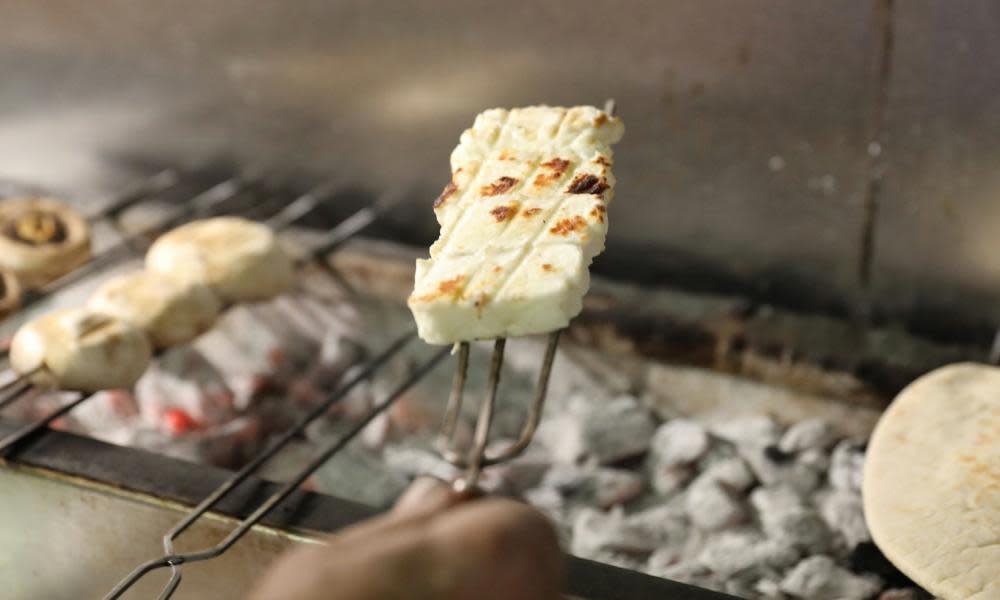EU special status for halloumi fails to calm divisions in Cyprus

Just when it seemed halloumi’s greatest battle had been won, the “white gold” of Cyprus is once again causing ructions.
Weeks after being awarded EU protected designation of origin (PDO) status, giving consumers the guarantee of an authentically made Cypriot product, the chewy cheese has managed to elicit anger on both sides of the UN-patrolled “green line” fracturing the divided country.
“With all these rules, the EU is asking us to make an imaginary product,” said Nikos Papakyriakou, who heads the Pancyprian Organisation of Cattle Farmers. “There’s a special formula to halloumi. But they’re demanding that, in addition to cow’s milk, it be made with 51% of sheep and goats milk. How is that possible when there are not enough sheep and goats here?”
The famously textured dairy product is regarded as a national treasure by Greek and Turkish Cypriots alike. After years of being embroiled in the complex machinations of the Cyprus problem, the republic’s president, Nicos Anastasiades, described winning the EU’s top quality mark as “a milestone day”, saying the trademark would help defend the famously textured cheese from numerous imposters. “A shield of protection is now in place,” he tweeted.
Related: All hail halloumi! 17 delicious recipes – from salty fritters to harissa flatbreads
As a recognised regional speciality, farmers in the island’s Turkish-controlled north will, for the first time, be able to export the cheese to the EU. Known as hellim in the breakaway territory, the once humble staple accounted for 40% of its exports in 2019, with most stocks heading to Turkey and the Gulf states. By contrast, halloumi exports from the island’s internationally recognised Greek-run south have long headed to the UK.
“It took so many years to get here,” said Nikolaos Isaris, the deputy head of the European commission offices in Nicosia, the island’s war-split capital. “Now that halloumi has received this special status, it can only be beneficial for the economies on both sides.”
Under the new rules, crates of EU-bound hellim will be allowed to cross the green line that has divided the country since 1974, when Ankara, invading in response to a coup aimed at union with Greece, seized the island’s northern third. Previously the special status had eluded it because of the impossibility of exporting goods directly from the north.
But opposition has been fierce. The entity, acknowledged only by Turkey, must now ensure that stocks comply with EU health and hygiene standards, while conducting such major trade across the green line and in ports in the south implies further recognition of the Republic of Cyprus.
Its hardline leadership, which has also objected to the way health inspections will be carried out, has decried the measures ahead of UN-led talks next week aimed at re-energising reunification negotiations.
Similarly, farmers in the south are furious that the move has been made at all. “Its utter treason,” said Papakyriakou. “How can a state on occupied land that nobody recognises do business with the EU? We will take our case to the European court of human rights.”
If the regulations were applied, production of halloumi in the island’s south would drop “by about 15%,” the Greek Cypriot said.
Demand for the cheese has rocketed in recent years, with markets in east Asia, including China, joining the list of countries that have developed a fondness for a delicacy that can be pan-fried and grilled. With supplies failing to keep up with shipping orders, producers have been forced to import sheep and goats.
The EU, which has announced a six-month grace period until the decision is applied, had hoped that its “cheese diplomacy” would help bridge the divide in Cyprus. With the two feuding sides destined to return to the negotiating table, it was hoped that the move would strike a note of optimism at a time when the quest for a solution to the west’s longest-running diplomatic dispute appears more elusive than ever.
“This was meant to be an important step towards reconciliation ahead of the UN-led meeting in Geneva next week,” said Fiona Mullen, who directs Sapienta Economics, a consultancy in the south. “Relations between the two sides have been in the deep-freeze, exacerbated by Covid, so any step towards reconciliation should be welcomed. This is a rare case of one since the collapse of [reunification] talks in 2017.”

 Yahoo News
Yahoo News 
